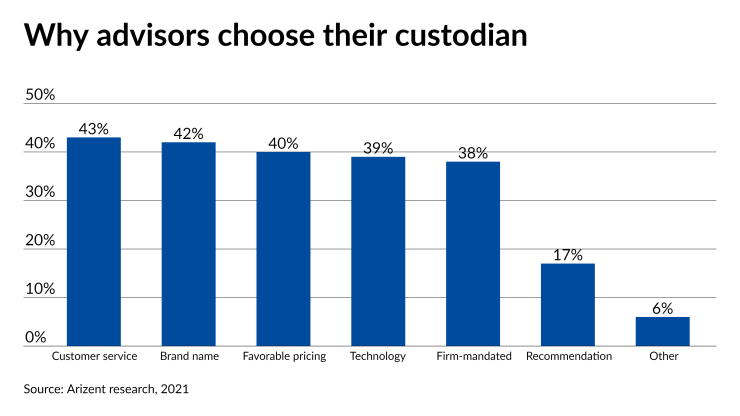Like so many other
TradePMR, the Gainesville, Florida-based custodian that clears through Wells Fargo, signed 20 new firms in the last 12 months, according to CEO Robb Baldwin, bringing its total RIA count to approximately 400. The custodian has 15 additional firms scheduled to transition in before the end of this year, he says.
With software the company launched earlier this month, the custodian is aiming to bring these new firms on board in less than six weeks each and make the burdensome process somewhat easier.
“Onboarding — it’s a big issue with so much money at play,” says Dennis Gallant, a senior analyst at research firm Aite Group. Gallant has seen it take anywhere from two weeks to six months for larger, more complex firms.
TradePMR has seen an influx in queries due to deals such as the
Additionally, as the three dominant players in the custody market get even bigger, some advisors say they’re looking for more personal attention.
“We are far more than just a number,” says Marc Horner, president of Fairhaven Wealth Management, a $725 million RIA in Wheaton, Illinois. Horner says that he had outgrown his relationship with Fidelity, which is why he moved assets over to TradePMR earlier this year. He has been in “constant contact with the team at TradePMR,” even late in the evening or over the weekends, while transitioning over, he says.
A Fidelity spokeswoman declined to comment.

Unlike competitors like RBC, who are sometimes willing to start relationships with firms who will introduce clients to the platform over time, TradePMR wants RIA clients to immediately move assets over.
“To do our service levels, we really have to have some kind of a size commitment from them,” says TradePMR CEO Baldwin.
With TradePMR’s new onboarding tool, the custodian hopes to ease the heavy lift of moving all an advisor's client assets at once. The software inputs customer account information from the advisor’s CRM, according to the company. Advisors can identify missing forms and information for new account opening, then go back to their clients with specific requests. The idea is to speed up the process, and avoid making clients re-sign forms with information they’ve already provided at some point, according to Baldwin.
“We're trying to make it as simple and easy as possible for an advisor,” he says.
RIAs welcome any moves to speed up the process of migrating custodians, according to Gallant. “Anything that makes it easier,” he says. “Even if it’s not perfect.”
For Gallant, six weeks to switch custodians “is actually pretty good.” Getting all the signatures and other paperwork required and moving the money and securities takes time, he says: “Rushing it too much can lead to errors or other issues.”
Prior to moving assets to TradePMR, advisor Horner had made two custodial transitions — from Merrill Lynch to UBS, then from UBS to Fidelity while opening Fairhaven.
Despite long-term outperformance, many of the leading 20 have suffered short-term losses.
Those transitions were faster: He had around 40 clients at the time. But after scaling his business to more than 460 clients through acquisitions, recruiting advisors and referrals, Horner says he was surprised how quickly his latest move to TradePMR went.
Still, no matter what method advisors use, it’s never easy to re-paper accounts.
“Having a transition is painful. There is no getting away from it,” Horner says.
Every firm has been working to improve their onboarding processes, according to Gallant. After all, there’s a lot of money at stake.
“It’s in everyone’s advantage to get assets over,” Gallant says. “The longer you take, the more likely assets might linger and stay.”






